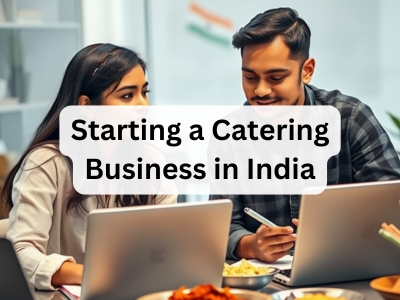Starting a Catering Business in India: A Complete Roadmap for Success
 The catering business in India is thriving, driven by a growing demand for professional food services at events, weddings, and corporate gatherings. With India’s diverse culinary culture and a rising middle class, the industry offers immense potential for entrepreneurs. According to recent studies, the catering industry in India is expected to grow at a CAGR of 12% from 2023 to 2028, making it a lucrative venture for aspiring business owners.
The catering business in India is thriving, driven by a growing demand for professional food services at events, weddings, and corporate gatherings. With India’s diverse culinary culture and a rising middle class, the industry offers immense potential for entrepreneurs. According to recent studies, the catering industry in India is expected to grow at a CAGR of 12% from 2023 to 2028, making it a lucrative venture for aspiring business owners.
Why Starting a Catering Business in India is a Smart Move

The catering industry encompasses providing food and beverage services for events, parties, and institutions. In India, the growing trend of elaborate celebrations and corporate events has led to increased demand for catering services. The industry thrives due to changing lifestyles, rising disposable incomes, and a preference for professionally managed food services, making it an ideal sector for entrepreneurs.
Reasons to Start This Business

- India’s catering market is projected to grow significantly, driven by urbanization and an increasing number of events.
- Government initiatives like “Make in India” and support for small businesses provide incentives for entrepreneurs. For assistance with India company incorporation services, you can explore professional guidance.
- Opportunities to specialize in niche markets such as vegan catering, regional cuisines, or corporate catering.
- Success stories of catering startups like The Food Co. and Big Bite Catering inspire new entrants in the industry.
Why You Should Start a Catering Business in India

India’s diverse food culture and growing economy make it a regional hub for the catering industry. With a young and vibrant population, the demand for innovative and high-quality catering services is on the rise. Success stories like Box8 and FreshMenu highlight the potential for growth in this sector, encouraging entrepreneurs to explore this opportunity. If you’re looking for a guide to start a business in India, we can help you navigate the process.
Detailed Steps to Establish Your Catering Business

1. Pre-establishment Phase
Before starting your catering business, conduct thorough market research to understand your target audience and their preferences. Analyze competitors to identify gaps in the market and choose a business model that aligns with your goals, such as event catering, corporate catering, or specialized cuisines. Selecting the right location for your kitchen or operational base is crucial for accessibility and logistical efficiency. You can also explore India company registration guides for step-by-step assistance.
2. Business Setup
Choose the legal structure of your catering business, such as a sole proprietorship, partnership, or LLP. Register your business with the appropriate authorities and obtain necessary documents like a GST registration certificate and a trade license. For professional support, consider corporate service providers in India. Set up your infrastructure, including a commercial kitchen equipped with essential appliances and tools. Ensure compliance with food safety standards and hire skilled staff to manage operations effectively.
3. Operational Planning
Allocate resources efficiently by planning your budget and procurement strategy for raw materials. Hire experienced chefs, kitchen staff, and delivery personnel to maintain high service standards. Incorporate technology, such as inventory management software, to streamline operations and minimize wastage. Develop standard operating procedures (SOPs) to ensure consistency in food quality and service delivery. For financial management, consider using AI accounting software.
4. Marketing and Business Development
Focus on building a strong brand identity through creative marketing strategies. Leverage digital marketing platforms, including social media and search engine optimization, to reach a wider audience. Collaborate with event planners and venue managers to secure partnerships and gain referrals. Establish an online presence with a professional website showcasing your menu, services, and customer testimonials. You can also use HRMS software for efficient staff management.
Local Regulations and Licensing

Starting a catering business in India requires compliance with several local regulations and obtaining the necessary licenses. Here are some key requirements:
- FSSAI License: Mandatory for all food businesses to ensure compliance with food safety standards.
- Trade License: Obtain this from your local municipal authority to operate legally.
- GST Registration: Required for tax compliance and invoicing clients.
- Health and Safety Permits: Ensure your kitchen meets hygiene and safety standards set by local authorities.
- Fire Safety Certificate: Necessary for commercial kitchens to comply with fire safety norms.
For a foreign company setup in India, additional permits may be required.
Challenges and Considerations

Starting a catering business in India comes with its own set of challenges. Here are some common hurdles and tips to overcome them:
- Market Competition: Differentiate your services by offering unique menus or specialized cuisines.
- Resource Management: Efficiently manage inventory and staff to reduce costs and improve profitability.
- Compliance with Regulations: Stay updated on local laws and ensure timely renewal of licenses and permits.
- Cultural Considerations: Cater to diverse dietary preferences and regional tastes to appeal to a broader audience.
By addressing these challenges proactively, you can build a sustainable and successful catering business.
Financial Planning Aspects

Proper financial planning is essential for the success of your catering business. Here are some key aspects to consider:
- Initial Investment: Allocate funds for kitchen setup, equipment, and marketing expenses.
- Operating Costs: Monitor recurring expenses like raw materials, staff salaries, and utility bills.
- Funding Options: Explore loans, grants, or partnerships to secure capital for your business.
- Revenue Projections: Estimate your income based on pricing, order volume, and market demand.
For professional assistance, explore accounting services to manage your finances effectively.
Conclusion
The catering business in India presents a lucrative opportunity for entrepreneurs, driven by growing demand and a vibrant food culture. By following the steps outlined in this guide and addressing challenges proactively, you can establish a successful catering business and tap into this thriving industry.
Ready to Start Your Catering Business?
If you’re ready to embark on your entrepreneurial journey, contact us today. Our team of experts provides comprehensive support for business registration, licensing, and financial planning. Learn more about our company’s mission and our expert team.
With the right planning and execution, you can build a thriving catering business that meets the needs of India’s dynamic market. Take the first step today and transform your passion for food into a profitable venture!

Frequently Asked Questions
What licenses are required to start a catering business in India?
Answer: To start a catering business in India, you need an FSSAI license, GST registration, a trade license, and health and safety permits. For detailed assistance, check out our India company registration guide.
How much investment is required to start a catering business?
Answer: The initial investment depends on the scale of your business. Costs typically include kitchen setup, equipment, raw materials, and marketing. Explore accounting services to manage your finances effectively.
What are the challenges of starting a catering business in India?
Answer: Common challenges include market competition, resource management, compliance with regulations, and catering to diverse tastes. Proper planning and professional guidance can help overcome these hurdles.
Can I register my catering business as a sole proprietorship?
Answer: Yes, you can register as a sole proprietorship or choose other structures like a partnership or LLP. For help with registration, explore India company incorporation services.
What is the best way to market a catering business?
Answer: Use digital marketing, social media, and partnerships with event planners. An online presence with a professional website is also essential for visibility.
Do I need accounting software for my catering business?
Answer: Yes, accounting software helps manage finances efficiently. Consider using AI accounting software for streamlined financial management.
Can foreign entrepreneurs start a catering business in India?
Answer: Yes, foreign entrepreneurs can start a catering business in India, but they must comply with additional regulations. Learn more about foreign company registration in India.
How do I create a business plan for my catering business?
Answer: A business plan should include market research, financial projections, and marketing strategies. Check out our guide on writing a business plan.

